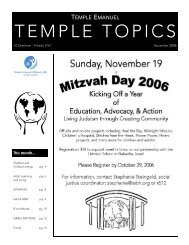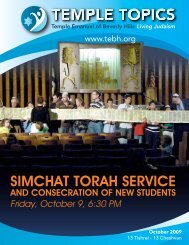February 29, 2012 - Temple Emanuel of Beverly Hills
February 29, 2012 - Temple Emanuel of Beverly Hills
February 29, 2012 - Temple Emanuel of Beverly Hills
You also want an ePaper? Increase the reach of your titles
YUMPU automatically turns print PDFs into web optimized ePapers that Google loves.
By Rabbi Laura Geller<br />
RabbiGeller@tebh.org<br />
The Rest <strong>of</strong> My Life<br />
The English word “sabbatical” comes from the word<br />
“Shabbat.” It was first used in 1886 to refer to a year’s absence<br />
granted to researchers which typically occurred once in every<br />
seven years <strong>of</strong> teaching. The idea emerged from the Biblical<br />
injunction to let the land lie fallow every seven years to give<br />
it a chance to regenerate. Not a bad idea for those who are<br />
teaching and researching to have a chance to take a breath<br />
and regenerate a bit. In fact, it is probably a good idea for all<br />
<strong>of</strong> us! Pr<strong>of</strong>essors and rabbis are among the lucky few whose<br />
pr<strong>of</strong>essions encourage this privilege. The clergy at <strong>Temple</strong><br />
<strong>Emanuel</strong> are grateful to have leadership who recognizes that<br />
it is important for clergy to have time to reflect, study and<br />
renew ourselves.<br />
Over my almost 17 years as rabbi here, I have taken two<br />
separate months <strong>of</strong> sabbatical leave, both in the summers<br />
when I studied as a Rabbinic Fellow in the Hartman Institute in<br />
Jerusalem. In January I will take another month <strong>of</strong> sabbatical<br />
leave to give me some time to think about a project which<br />
I hope will benefit the congregation and myself as well:<br />
reaching out to baby boomers and helping them discover<br />
meaning and purpose through their connection to Jewish<br />
experience and our synagogue.<br />
My greatgrandparents’ lifetime was characterized by three<br />
major life stages: childhood, midlife and old age. The idea<br />
that “adolescence” was a life stage didn’t develop until the<br />
early years <strong>of</strong> the twentieth century. For my parents, there<br />
was childhood, adolescence, midlife and then retirement<br />
at 65 to Florida. For the Boomer generation it seems to be<br />
different. We are seeing a lot being written about another<br />
life stage between midlife and old age, sometimes called<br />
“the third stage” or the “encore stage.” It constitutes a very<br />
large cohort, getting larger by the year. As <strong>of</strong> January, 2011,<br />
a person in the United States will turn 65 every eight seconds.<br />
(4) TEMPLE TOPICS /// JANUARY – FEBRUARY <strong>2012</strong><br />
The well known social scientist Steven Cohen has written:<br />
“Boomers (people born between 1946 and 1964) are the<br />
first generation in human history… to reasonably anticipate<br />
living well and wholesomely into their 80’s and 90’s if not<br />
beyond…. Jews (as others) are not only living longer, they<br />
are living in an age <strong>of</strong> meaning-seeking, with the interest<br />
and wherewithal to make living a life <strong>of</strong> meaning an ultimate<br />
and reasonably obtainable objective for any point in their<br />
lives. As such, this aging, yet largely healthy generation <strong>of</strong><br />
American Jews poses a challenge and an opportunity to<br />
a society and community that is as yet unprepared for the<br />
totally new policy and planning opportunities that loom in<br />
the near future.”<br />
My sabbatical project will begin with my catching up on the<br />
literature that relates to this third stage; it turns out there<br />
is quite a bit, but not much <strong>of</strong> it focused on the Jewish<br />
community. I also intend to meet with people already thinking<br />
about these questions around the country. I’m hopeful that<br />
when I return to work in <strong>February</strong>, we can begin a series <strong>of</strong><br />
informal conversations that will help us clarify how best to<br />
create a culture within our congregation that helps the Baby<br />
Boomers among us celebrate the next stage <strong>of</strong> our lives.<br />
Let me know after <strong>February</strong> 1 if you would be interested in<br />
being part <strong>of</strong> one <strong>of</strong> these conversations.<br />
I’ll be back in time to welcome one <strong>of</strong> my heroes, Anat<br />
H<strong>of</strong>fman, Director <strong>of</strong> the Israel Religious Action Center,<br />
sponsored by the Reform Movement, and a leader <strong>of</strong> Women<br />
at the Wall, on Friday night <strong>February</strong> 3. More information<br />
about her visit is on page 22. I hope I’ll see you there.<br />
Save the Date:<br />
Behrendt Scholar-in-Residence<br />
Rabbi Rachel Cowan�<br />
Senior Fellow, Institute for Jewish Spirituality<br />
March 9 and 10<br />
"Growing Older and Wiser"<br />
"Bringing Mindfulness into Your Daily Life"




